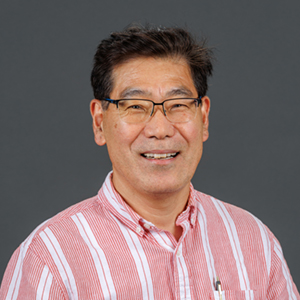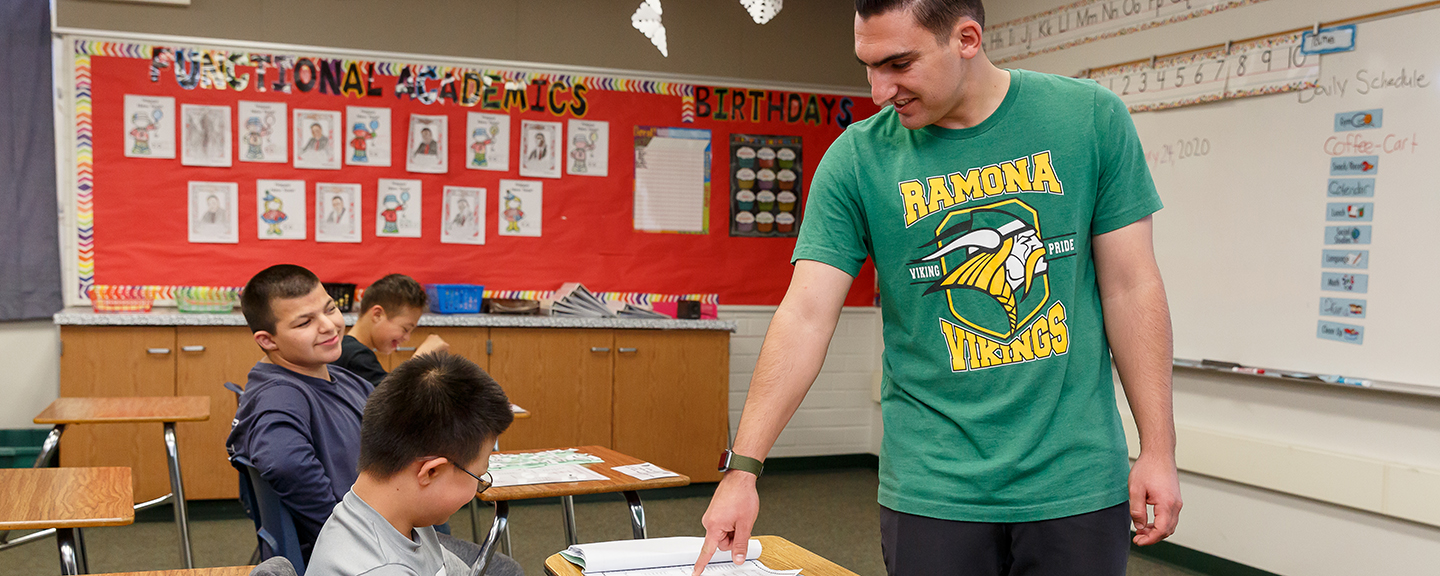
Teaching, MAEd, and Multiple Subject Teaching Credential
Earn an MA in Education: Teaching and Multiple Subject Teaching Credential at Azusa Pacific University
You’ll graduate equipped and credentialed for teaching positions at the elementary school and middle school levels (K-8). Build your résumé through a broad range of clinical experiences in the classroom, providing opportunities to apply teaching practice in diverse settings. Whether you are looking to fortify your teaching qualifications or are making a career change from another field, you’ll graduate set apart in the job field by your creativity and commitment to students.
Program at a Glance
Upcoming Events
Dates coming soonApplication Deadline
Start times are available throughout the year—fall, spring, and summer. The upcoming application deadlines are:
- Summer 2024: March 25, 2024
- Fall 2024: July 22, 2024
Program Information
- Program Units: 44-47
- Cost per Unit: $675
- Base Cost: $29,700-$31,725*
Location
- Azusa (Main Campus), High Desert, Murrieta, Orange County

Gain Hands-on Experience
- Apply a Christian worldview to your calling as a teacher.
- Directly apply practice through real-world classroom practicums.
- Serve the unique academic needs of students from diverse backgrounds.
- Learn from expert faculty with professional teaching experience.
- Earn your credential from a reputable educator preparation program.
By the Numbers
Get Started
Program Details
This program includes comprehensive foundation courses emphasizing teaching and educational methods, as well as specialization courses providing content required for the multiple subject credential. Practical classroom and fieldwork experiences provide application to theory, preparing candidates to teach in diverse settings. Advanced coursework in the emphasis area of teaching provides the context for evaluation, analysis, and continuous improvement of teaching practices and programs, providing breadth to a rich and robust program.
Browse the tabs below—if you have questions, visit the Student Services Center page, and we’ll make sure you get the info you need.
Informational Meetings
Prospective students may attend an informational meeting prior to submitting an application. Complete details regarding admission and specific program requirements, advising, and general information are discussed at information meetings. For details on upcoming dates, meeting locations, or registration, check the School of Education's information meeting calendar or call (626) 815-5376.
Admission Requirements—Domestic Applicants
The university graduate and program admission requirements below must be met before an application is considered complete.
- Graduate application for admission
- $45 nonrefundable application fee
- Official transcripts from all institutions leading to and awarding the applicant’s
bachelor’s degree from a regionally accredited institution and all postbaccalaureate
study
An official transcript is one that Azusa Pacific University receives unopened in an envelope sealed by the former institution and that bears the official seal of the college or university. A cumulative minimum 3.0 (on a 4.0 scale) grade-point average on the posted degree is required for regular admission status. Provisional admittance may be granted to individuals with a lower GPA if competency can be shown through multiple measures. - Two recommendations that assess competence and character. Appropriate recommendations include those who have supervised the applicant’s leadership or teaching experience with children/youth in public or private settings, an employer who directly supervised the applicant, or one faculty/academic reference. References from neighbors, friends, and relatives are not appropriate, unless they have served as supervisors. Additional letters are optional.
- Résumé (preferred) or statement of experience including the most relevant work and volunteer experience
- One- to two-page personal statement addressing the following topics: experiences from the applicant’s background that may enhance the teaching experience; the most rewarding and challenging aspects of working with youth; why the applicant wants to teach; preferred grade level and content areas and why; and how the applicant envisions supporting the success of all students and contributing to the profession. Written communication skills will be assessed along with content.
- Proof of Certificate of Clearance (COC). Applicants for Summer or Fall Terms must have a COC valid through January 31. Applicants for the Spring Term must have a COC valid through June 30. View instructions on Obtaining a Certificate of Clearance (PDF). Applicants are encouraged to begin this step as soon as possible to allow time for the California Commission on Teacher Credentialing to process your information.
- Proof the Basic Skills Requirement has been satisfied
- Proof of subject matter preparation or proof of paid registration for the next appropriate California Subject Examinations for Teachers (CSET) administration (view teacher test preparation resources)
Send official transcripts to:
Office of Graduate and Professional AdmissionsAzusa Pacific University
PO Box 7000
Azusa, CA 91702-7000
[email protected]
Watch the Application Tutorial
What to Expect
After all admission materials have been received by the Student Services Center, the faculty or department chair reviews the applicant’s file. The applicant is notified in writing of the admission decision.
Admission Requirements—International Applicants
Azusa Pacific University is authorized under federal law by the U.S. Citizen and Immigration Services and the U.S. Department of State to enroll nonimmigrant, alien undergraduate and graduate students. APU issues and administers both the I-20 and DS 2019 (F-1 and J-1 status documents respectively).
To apply for a graduate program at APU, the following requirements must be fulfilled in addition to meeting the domestic applicant and program-specific admission requirements specified above.
International applicants must also:
- Demonstrate proficiency in English through a placement test with the Academic Success Center, or through a TOEFL/IELTS score that meets program-specific requirements. Refer to APU’s English proficiency requirements to learn more. Request that official test scores be sent to APU. All other forms of proof indicated in the English proficiency requirements must be submitted directly to International Services.
- Provide a Graduate Affidavit of Financial Support (PDF) and a bank statement from within the last six months proving financial ability to pay for education costs through personal, family, or sponsor resources.
- Submit a copy of a valid passport showing biographical data, including your name, country of citizenship, date of birth, and other legal information.
- Get foreign transcripts evaluated. International credentials (transcripts, certificates, diplomas, and degrees) must be evaluated by a foreign transcript evaluation agency. View our policy and a list of approved Foreign Transcript Evaluation Agencies.
Send official transcripts to:
Office of Graduate and Professional AdmissionsAzusa Pacific University
PO Box 7000
Azusa, CA 91702-7000
[email protected]
What to Expect
After all admission materials have been received by the Student Services Center, the faculty or department chair reviews the applicant’s file. The applicant is notified in writing of the admission decision.
Multiple financial aid options are available to make your Multiple Subject Teaching Credential affordable.
Delivering high-quality graduate programs takes a comprehensive support system. Your investment in an advanced degree or program includes a network of services and personnel who partner with you in pursuit of higher education. Below is a breakdown of some common fees associated with School of Education programs.
School of Education Fees
| Cost | |
|---|---|
| EdD in Educational Leadership (per unit) | $1,159 |
| EdD in Educational Leadership dissertation continuation courses (per unit) | $569 |
| Education master’s degree, credential, authorization, and certificate programs (except School Counseling and School Psychology programs) (per unit) | $675 |
| School Counseling and School Psychology, and LPCC programs (per unit) | $813 |
| BCBA Certificate (per unit) | $799 |
| Audit (per unit) | half-price tuition |
| School of Education assessment fee (Taskstream/Teacher Performance Assessment; flat fee equal to cost of .25–1 unit, depending on the program and course the fee is attached to) | no longer applicable |
| Intent to Commence and/or Graduate Fee | $100 |
View a complete list of university fees.
All stated financial information is subject to change. Contact the Student Services Center at (626) 815-2020 for more information.
Financial Aid
Several types of financial aid are available to graduate students. The resources range from federal loans and state grants to, for some graduate programs, fellowships and scholarships. For details about financial aid available for your program, please contact the Student Services Center at (626) 815-2020.
Military Benefits
Military members—and in some cases their spouses and dependents—qualify for financial assistance covering tuition, housing, and books. Azusa Pacific is a Yellow Ribbon University and Military Friendly School, so you can be confident that you’ll receive the benefits and flexibility you need to complete your education.
School of Education Scholarships
APU also provides information on numerous financial aid options for prospective School of Education students. Learn more about the aid opportunities available.
School of Education Alumni Tuition Discounts
APU’s School of Education offers an alumni tuition discount for Azusa Pacific alumni starting in a graduate program.
Students must be in good academic standing and maintain satisfactory academic progress with a minimum cumulative grade-point average (GPA) of 3.0. Students must be enrolled at least half-time. If qualifications are met, the discount may be renewed each term. APU will pay $500 per term (up to $2,000 over the course of the program). This discount cannot be combined with other institutional aid. Contact Student Financial Services for complete eligibility details.
Notes on Eligibility: The School of Education’s doctoral program (Ed.D. in Educational Leadership) and the Clear Administrative Services Credential (CASC) program are not eligible for the alumni tuition discount. APU doctoral alumni are also not eligible for the School of Education alumni discount. Additionally, the alumni discount cannot be combined with other institutional aid, such as School of Education scholarships. Students who are eligible for both may choose to receive either the alumni discount or an APU scholarship. Contact Student Financial Services for complete eligibility details.
Note: Award and eligibility are applicable for the 2022-23 academic year and apply to students admitted beginning fall 2020. The discount is subject to change.
To view specific requirements and coursework information, visit the current academic catalog:
How many units do I take each term?
Students may take no more than 8 units per eight-week term, which includes a maximum of two methods or education classes and their corequisite field experiences (if appropriate).
How long is a term?
Each term has two sessions (Fall I and Fall II, Spring I and Spring II). Each session is eight weeks in length. The 16-week student teaching semester covers Fall I and II or Spring I and II.
How many hours does each class session require?
Each class requires that students meet for approximately 5 hours, once a week.
How many evenings per week do I attend classes?
Students meet one night a week for eight weeks.
Does APU require theses, dissertations, or capstone projects?
Students are required to complete a capstone project for this program.
How soon can I finish this program?
This program can be completed in three semesters and one summer session.
If you have questions, we’re here to help! Connect with a representative who can walk you through the program details and application process.
Contact Your Admissions Representative
Additional Program Contacts
- Regula Schmid, EdD, program director, [email protected]
- Anakayla King, program coordinator, [email protected], (626) 815-5474
- Catherine Hahs Brinkley, EdD, chair, [email protected]
Division of Teacher Education
Phone
(626) 815-6018
Fax
(626) 815-5416
Azusa Pacific University
PO Box 7000
Azusa, CA 91702-7000
Student Services Center
Contact (626) 812-3016 or [email protected], and visit apu.edu/ssc for details on the admissions process, financial aid, and class registration.
International Services
International students should contact +1-626-812-3055 or [email protected], and visit apu.edu/international/.
- Azusa Pacific University is accredited by the WASC Senior College and University Commission (WSCUC).
- The School of Education receives accreditation from the Council for the Accreditation of Educator Preparation (CAEP), making APU one of only three schools in California with this distinction.
- Our credential programs are accredited by California’s Commission on Teacher Credentialing (CTC).
Featured Faculty

Ie May Freeman
Associate Professor, Division of Teacher Education

Amber Lynwood
Assistant Professor, Division of Teacher Education

HeeKap Lee
Faculty Coordinator, MAED in Teaching; Professor, Division of Teacher Education
Career Outlooks and Outcomes

The Golden State Teacher Grant: An Overview and APU’s Connection
APU is proud to be a recipient of the Golden State Teacher Grant, helping prospective California teachers to fund their education in pursuit of a teaching credential.